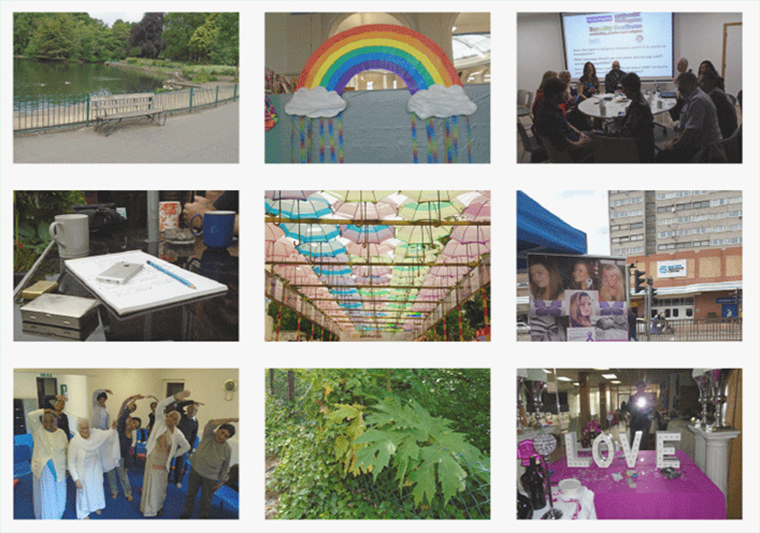Community researchers in Greater Manchester have been exploring this question, with cameras in hand, as part of a project co-designed by Jam & Justice’s Action Research Collective. There are some obvious things that people can do to participate in politics - voting, standing for election, joining a political party, or responding to consultation. But what about the less formal ways that people participate in everyday politics?
Grassroots community workers came together to consider this question, applying the theory of “everyday makers”. Everyday makers are people who get involved in local and concrete projects with a DIY-ethos, who make a real difference to people’s lives and the benefit the local community. Everyday makers are well-known, well-networked and trusted across their communities, working either as part of a community-led action group or by themselves. Everyday makers create tangible changes that make a difference to their communities.
They are doing what we might call everyday politics.
Everyday politics shows that people have power to make a difference in their communities.
Over eight months, action researchers explored how people participate in everyday politics through photovoice, a community-based research method that uses photographs as a basis for discussion. Community researchers took photographs to capture what they do in their local communities to make a difference.
The community researchers analysed the photos taken, identifying themes within everyday politics. This analysis showed that everyday politics is about valuing the strengths in our communities; connecting people; questioning the status quo; reasoning to create shared understandings; and developing solutions.
Pete Simms, who participated in the project, explains that:
“…it's about doing. It's about being willing to get your hands dirty, it's about being willing to be the one who sees things differently. Everyday makers are artists, they're the ones who see the everyday and can help to transform it into something which is amazing. As an everyday maker, someone who supports and encourages change at a grassroots level, the Jam and Justice photovoice project has been an amazing opportunity. In showing how real change can be achieved and sustained at the micro level it allows for wider conversations to happen which can and do influence change on a regional and national level
Sarah Whitehead, one of the research team, added that:
“There are many ways in which ordinary people are creating socio economic change together every single day. People who don’t understand complex political systems and processes, but who do understand that change starts with compassion and connection within our communities. We call this Everyday Politics. Working with everyday makers and using Photo Voice as a tool has enabled this project to be truly inclusive and accesible to all regardless of age, education or ability - giving a deeper insight into the radical grassroots led social change that is taking place across the UK and all begins with loving each other a little bit more.
As a co-designed project, The System Doesn’t Work began with a negative premise - that many people had lost faith with formal political institutions. The result, a touring exhibition and resources presenting “Everyday Politics” illustrates positive ways in which everyday makers are making a difference in their communities. Community researchers showed that everyday politics can help people to make change collectively. The work of everyday makers often goes unrecognised. The research in the project suggests that it can be an energetic way to do participatory politics in action. It has potential to transform relationships that are fundamental in supporting the textured fabrics of our communities.
Everyday makers can do things differently. The work of everyday makers in the research built on people’s strengths, connected communities, encouraged dialogue, and developed creative solutions to problems that those people and their communities were experiencing.
We can learn from everyday makers to think about how we do politics in a more collective way - where there is a greater emphasis on building on the ideas, assets and strengths of our communities to create more just futures. The exhibition will be touring community venues throughout 2019, bringing others into the conversation about everyday politics.
The System Doesn’t Work was funded by the ESRC as part of Jam & Justice. The Action Research Team were Sarah Whitehead (Community Pride), Amanda Bickerton (Church Action on Poverty), Julie Asumu (Chrysalis), Catherine Durose (University of Birmingham), and Dan Silver (University of Manchester). Community researchers included Aba Graham, Daniel Nkrumah, Saraswati Sinha, Elaine Unegbu, Jane Gregory, Nidhi Minocha, Pete Simms, Tony Wright, and Steven Calver.
A copy of the exhibition booklet can be downloaded here.
* To learn more about the theory behind “everyday makers” see [https://openresearch-repository.anu.edu.au/bitstream/1885/42117/2/Henri…, and https://www.cogitatiopress.com/politicsandgovernance/article/view/1213].
